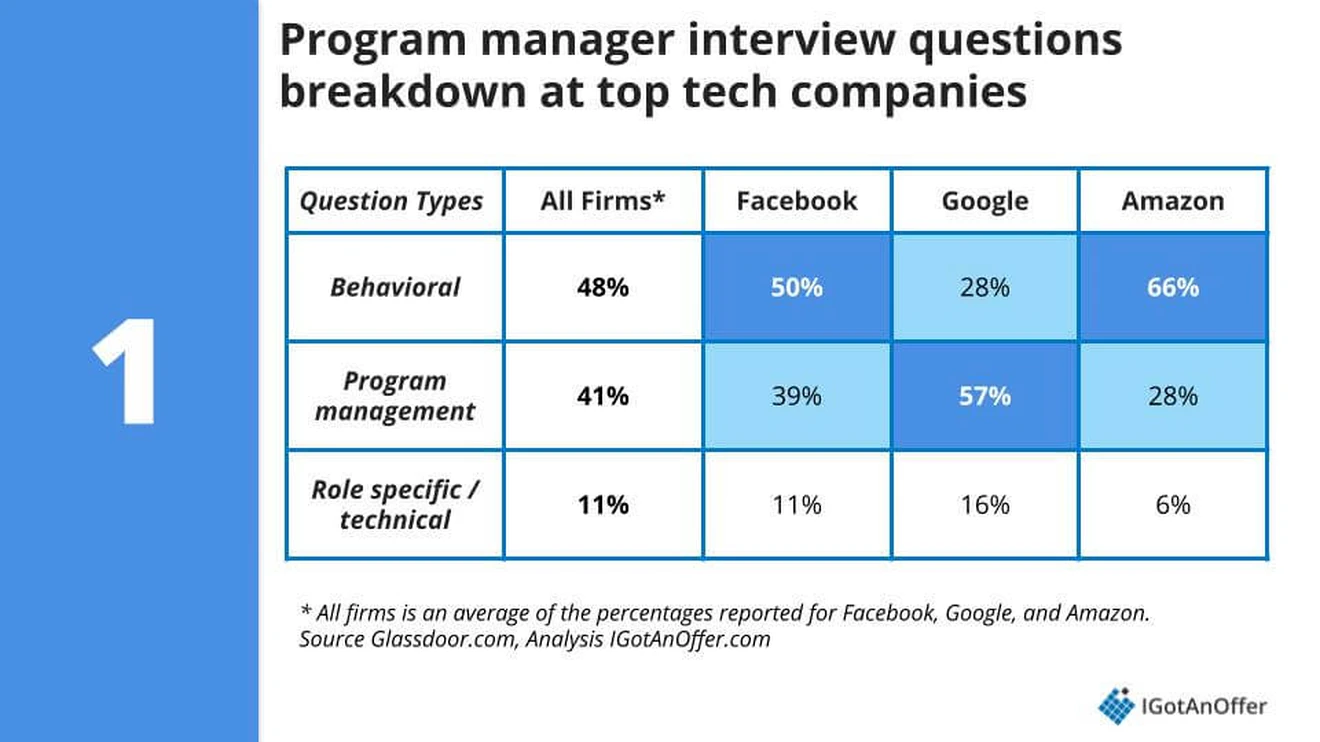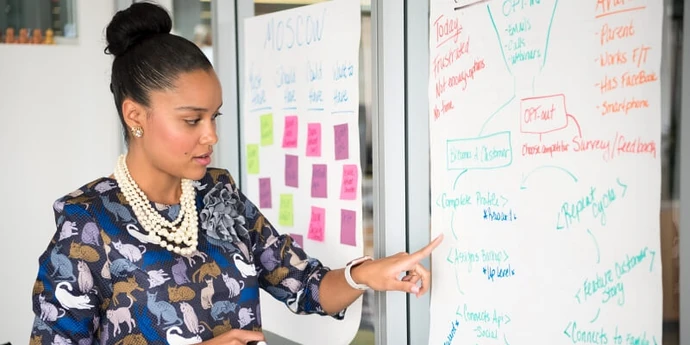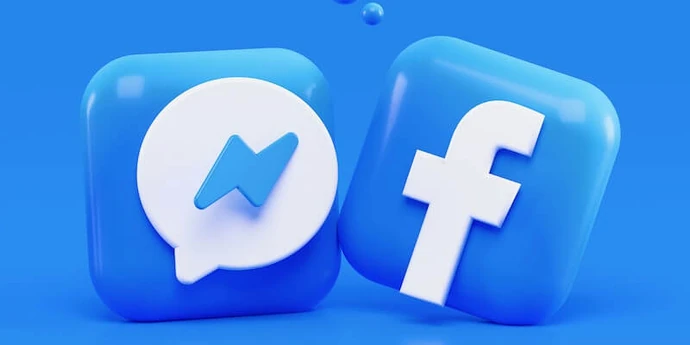Program manager interview preparation is a big challenge. There are a variety of question types you'll need to master, and tech companies like Facebook, Amazon, and Google don’t always focus on the same ones.
So, what do you do? And where do you start?
That’s where we come in. From analyzing 250+ program manager interview questions reported by real candidates on Glassdoor, we’ve got a good idea of how to crack program manager interviews at top tech companies. Below, you’ll find an interview timeline, a breakdown of the three most common question types, practice examples, and links to resources for extra prep.
To begin, here’s a quick overview of our step-by-step guide:
- Learn the program manager interview process
- Practice with example questions
- Study these top tips and resources
- Do mock interviews
Click here to practice 1-on1 with ex-FAANG interviewers
1. Learn the program manager interview process
We'll be giving a general overview of the program manager interview process here, but if you need insight into a particular company, refer to one of our company-specific preparation guides below.
- Facebook program manager interview guide
- Amazon program manager interview guide
- Google program manager interview guide
So, what’s the general interview timeline? It normally takes between 4 and 8 weeks in total but can take longer.
It typically follows these steps:
1.1 What interviews to expect
- Recruiter phone screen: one interview
- Writing exercise (Amazon only)
- First-round interviews: one or two interviews
- Onsite interviews: four to five interviews
Let's look at each of these steps in more detail below:
1.1.1 Recruiter phone screen
After your application is accepted, you'll generally start your interview process by talking to a recruiter on the phone. They are looking to confirm that you've got a chance of getting the job at all, so be prepared to explain your background and why you’re a good fit for the company. You should expect typical behavioral and resume questions like "Tell me about yourself", "Why this company?", etc.
If you get past this first HR screen, the recruiter will then help schedule your next interview. At this time, they’ll also walk you through the next steps in the hiring process, and they’ll likely share some company resources to help you prepare. If you need clarification on your incoming interviews, this is a good time to ask.
1.1.2 Writing exercise (Amazon only)
If you’re interviewing at Amazon, there’s a chance you’ll have a written test. This is the one major tech company out of the three we’ve analyzed (Facebook, Google, and Amazon) that uses them.
The exact nature of this test can vary depending on the role you’re applying for. It could take the form of a two-page essay on a given topic such as, "Talk about an experience in which you were able to simplify the lives of your customers", or it may aim to test your numerical skills or another skillset important to the role.
In case you are asked for this, keep a lookout in your inbox (we’ve seen reports of candidates not realizing they had a written test because the request went into their spam folder). If in doubt, you can always double-check with your recruiter. They are there to help you navigate the interview process.
1.1.3 First-round interviews
Before the onsite round, you'll go through one or two more interviews. These will either be with a hiring manager, a program manager, or both. It will usually take place over the phone or via video chat.
The types of questions you'll be asked in this round are roughly the same as the questions you'll encounter in your onsite interviews. In particular, you'll want to be well prepared for behavioral and program management questions. More on this in section 2.
The role of this step is to make sure it's worth bringing you onsite. Your interviewer will therefore try to make sure there isn't an area where you are particularly weak and don't stand a chance of meeting the hiring bar.
1.1.4 Onsite interviews
If you pass the initial interviews, you'll be invited onsite. These final interviews are the biggest test for program management candidates. During this interview loop, you'll have five or six one-hour interview rounds, in addition to lunch in the company cafeteria.
You'll mostly be interviewed by current program managers. But, depending on the company, role, and circumstances, you may also have interviews with an HR rep, a senior executive or, in Amazon’s case, the “Bar Raiser.” We’ll get into the questions you’ll be asked in section 2.
[COVID Update] Given the Covid-19 pandemic, your onsite interviews will likely be conducted virtually. You can ask your recruiter for the latest information on their Covid-19 adjustments.
Right, ready to get into the interview questions?
Let's go.
2. Practice with example questions
You can expect three broad types of questions in your program manager interviews.
Here's a breakdown of the frequency with which these question types generally appear during program manager interviews at leading tech companies. The numbers and categories below are based on real interview data from Glassdoor, along with our analysis here at IGotAnOffer:
- Behavioral questions (48% ) test your ability to work effectively with cross-functional teams. You'll be asked questions about how you overcame team conflicts, troubleshot issues, etc.
- Program management questions (41%) test how good you are at delivering programs. You'll be asked questions about program management processes and skills, like planning and leading project teams.
- Role-specific / technical questions (11%) test your role-specific knowledge and experience. The exact questions you'll face here depend on the role and functional area where you'll be working and could include questions that test your technical depth.
For a full breakdown across top tech companies, refer to the graphic below.

You'll notice that there is considerable focus on behavioral and program management questions across all the companies listed above. However, you'll also notice that some companies emphasize different questions more than others. For instance, Facebook and Amazon tend to focus more on behavioral questions, whereas Google focuses more on program management questions.
Now that you have the high-level view of the question types that are asked in program manager interviews at leading tech companies, let's dig deeper into each type of question.
2.1 Behavioral interview questions
Program managers are the glue between product, design, marketing, engineering, and other teams. They need to be able to communicate clearly, work well with others, and resolve project issues.
Your ability to perform these functions will be assessed using behavioral interview questions. Be prepared to talk about your top accomplishments, situations where you've resolved conflict, and your motivation for applying to the specific company and role.
Now, here are the example questions:
Example behavioral questions
- Why do you want to work at this company? (sample answer from Amazon interviews)
- What are your strengths and weaknesses?
- Walk me through your resume
- Tell me about a time you had a disagreement with a coworker
- Give me an example of an uncertain situation at work and how you dealt with it
- Tell me about a time you had to act with limited information
- When did you take a risk, make a mistake, or fail? How did you respond, and how did you grow from that experience?
- Tell me about a situation where the problem was really difficult but you came up with an easy solution
- Define your ideal work environment and manager
- Tell me something you've learned that made you better at your job
- Take me through a scenario where you went above and beyond your job responsibilities
- What would you say is your superpower?
2.2 Program management interview questions
The second most frequently asked questions on program manager interviews are those focusing on program management processes and skills.
Depending on your specific role or functional area, the day-to-day program manager responsibilities can vary significantly. Sometimes you might work at the program level (i.e. across a few different projects). In other situations, your work could look very similar to that of project managers or product managers.
And just as the role itself can vary, the questions you'll be asked during your interviews will also vary. As a result, we'd suggest practicing two broad categories of program manager questions:
- Program management processes
- Kick-off
- Planning
- Execution
- Monitoring
- Closing
- Program management skills
- Leadership
- Partnership
- Estimation
- Other
As you can see, each category has some sub-categories within it. But don't worry, they're actually fairly easy to remember when you understand what each category represents.
Let's begin by digging into the process questions all at once, and then we'll cover the skill questions. You should get a feel for the categories as we work through them.
2.2.1 Program management process questions
If you're familiar with project management, you may notice that the 5 categories listed under program management processes are roughly aligned with the PMBOK project management process groups. For our purposes, essentially all this means is that "process" questions are aligned with the lifecycle of a project (e.g. kick-off, planning, execution, monitoring, and then closing).
Below, we've provided example interview questions for each of these project processes. These are all roughly aligned with the PMBOK process groups. We'd encourage you to practice answering at least one question from each sub-category.
Example program management process questions
Kick-off
- How do you kick off a new project?
- Tell me about a program that you managed from kick-off through execution
Planning
- What steps would you take to launch X product?
- What is critical path and what happens if it changes?
- Tell me about a time you had a plan, but you encountered some obstacles. What did you do about it?
- You have 12 months to roll out a new product. Describe in detail how you would manage the process
Execution
- Tell me about a problem you faced when going from strategy to implementation
- How do you manage a complex program that consists of multiple projects?
- Your entire team can only use one spreadsheet. How would you optimize the design of the spreadsheet to make sure it works well for everyone?
- Describe a time you sacrificed short term goals for long term success
- Tell me about a time where you had to work on a tight deadline
Monitoring
- How will you handle reporting multiple projects when some of them are falling behind in schedule?
- Tell me about a project you managed. What were some of the metrics you used to determine the success of the project?
- How would you derive metrics?
- Tell me about a time you used analytics to make a decision.
Closing
- How do you know if a project is done?
2.2.2 Program management skill questions
While the program management process questions covered the PMBOK process groups, the "skill" category covers commonly-asked questions that assess other key skills: leadership, partnership, estimation, and a few others.
For leadership questions, you can expect these to sound very much like behavioral interview questions. However, we've separated leadership questions from behavioral questions because they tend to focus on leadership areas that are particularly important for program managers.
The primary focus for partnership questions is to evaluate your ability to work with a variety of stakeholders to move programs and projects forward. To do this, you'll need to build good working relationships and influence other people’s priorities without direct authority over them.
Estimation questions are a bit different than the others, as they will test your logic, mental math and problem-solving skills. Regardless of the subject of the question, you'll need to show that you can break down the question into logical pieces and come to a reasonable conclusion.
Finally, there are a few other types of questions that get asked in program manager interviews, such as brain teasers and prioritization questions. Note: some companies like Amazon and Google have confirmed that they no longer use brain teasers in interviews. If you’re unsure whether to expect one from the company you’re interviewing with, try out one of the examples below to work out an approach in case any come up.
Example program management skills questions
Leadership questions
- How do you advocate for a commitment to a priority, when that priority is not high on someone else's list?
- Tell me about a time you had to disagree with an executive
- Imagine you are working with a lot of engineers in this role. Given that engineers speak a slightly different language, how would you approach communications?
- Tell me about a time when you used feedback about your team to drive a change. How did you gather or receive feedback on your team's performance? What was the outcome?
Partnership questions
- Have you ever collaborated with multiple teams? What challenges did you face?
- Describe a time when you had to earn the trust of your project team and break their resistance to change. How did you do it, and what was the biggest challenge?
- Give an example of how you've worked with cross-functional teams. What role did you play?
- Tell me about a time someone changed your mind on a topic. How did you feel about it?
Estimation questions
- How much revenue does YouTube make per day? (Solution)
- Estimate the costs of building a subway system
- What is daily collection at the busiest toll road in [name of local city]?
- How many cars are registered in [name of local city]?
- What is the daily revenue for a Jamba Juice location?
Other (brain teasers, prioritization, etc.)
- How do you prioritize competing projects, goals, or stakeholder requests?
- How many ways can you choose 3 desserts from a menu of 10?
- What is the angle between the hour hand and the minute hand on a clock at 4:20?
- Tell me about a program you’ve managed before
2.3 Role-specific / technical interview questions
Program manager interviews tend to focus primarily on behavioral and program management questions. However, not all program manager jobs are the same, so you should also do your homework on the job description and any other details about the role that you can find.
You'll want to be prepared to speak intelligently about the functional area where you'd be working. If your role would be in a technical area, or if you'd be working closely with engineers, then your interviewers may also decide to ask you a few technical questions to evaluate your depth of knowledge and your ability to communicate about technical details.
The below example questions are focused on technical topics and specific product or functional areas. This should give you a sense for how these questions tend to be asked. When you begin practicing for your own interviews, you'll want to customize the questions below to a product or topic that is relevant to your target role.
Example role-specific / technical questions
- What are some challenges facing cloud technology?
- Suggest 5 ways to improve Google Maps & Gmail
- Describe the logic for writing a doubly linked list
- Explain how TCP works
- Explain what happens in the back-end network when you use Facebook
- Suggest a new product or market segment that Google should develop
- Tell me the difference between AC and DC power transmission
3. Study these top tips and resources
Now that you’ve seen the practice questions, let’s get into some resources and tips that should help you answer them.
3.1 Behavioral questions interview prep
For behavioral interviews, we recommend consulting our leadership and people management primers for tech interviews, then learning our step-by-step behavioral interview method and creating a bank of 10+ personal stories that demonstrate your qualifications and top skills. You'll find this method in our Facebook behavioral interview guide, but it can apply to any company. For a company like Amazon, you’ll want at least one story that matches each of its 16 leadership principles.
Once you've got a bank of stories, you can practice using them to answer the behavioral questions we've listed above. Emphasize different aspects of your story depending on the exact question asked so that, with practice, you'll get used to tailoring your stories to fit different questions.
3.2 Program management interview prep
To prepare for the program management questions you'll face during your interviews, it's important to brush up on program management basics. A big part of a program manager's role actually comes back to project management skills. As a result, we also recommend brushing up on project management fundamentals using a free guide, like this one published by Wrike.
This will give you an opportunity to refresh your memory on the key aspects of project management, like scope, schedule, resources, stakeholders, etc.
In addition, you should make sure you're on top of common concepts used in Agile project management. A great resource for this is Atlassian's Agile project management guide. In particular, we recommend brushing up on the difference between Kanban and Scrum, and the common structures used in Agile projects (e.g. epics, stories, themes, etc.).
For leadership and partnership questions, you can use a similar approach to behavioral questions, with an emphasis on program management skills. On the other hand, for estimation questions, we'd recommend reading our separate guide on estimation questions (note: this guide is written for product managers, but the contents will still be relevant for this type of question).
Once you've refreshed your memory on these topics, you should go through the list of program management questions we've listed in section 2 and draft answers for those.
3.3 Technical interview prep
You should also make sure you're well prepared for role-specific questions by learning as much information as you can about the role, industry, and/or functional area to which you're applying.
You can begin by doing online research and carefully understanding each part of the job description. It's also a great idea to reach out to any connections you have that are involved in similar roles. Your recruiter may also be able to provide you with some additional information in advance.
If you anticipate that you'll have a technical role, or you just want to make sure you're prepared for any technical questions that may arise, then our Technical Program Manager guide would be another helpful resource.
4. Do mock interviews
We've coached more than 15,000 people for interviews since 2018. There are essentially three activities you can do to practice for interviews. Here’s what we've learned about each of them.
4.1 Learn by yourself
Learning by yourself is an essential first step. We recommend you make full use of the free prep resources on this blog. Learning the question types and the specific interview process for your favorite company will go a long way in helping you prepare. But this information is not enough to land you a program manager job offer.
To succeed in your program manager interviews, you're also going to need to practice under realistic interview conditions so that you'll be ready to perform when it counts. But by yourself, you can’t simulate thinking on your feet or the pressure of performing in front of a stranger. Plus, there are no unexpected follow-up questions and no feedback.
That’s why many candidates try to practice with friends or peers.
4.2 Practice with peers
If you have friends or peers who can do mock interviews with you, that's an option worth trying. It’s free, but be warned, you may come up against the following problems:
- It’s hard to know if the feedback you get is accurate
- They’re unlikely to have insider knowledge of interviews at your target company
- On peer platforms, people often waste your time by not showing up
For those reasons, many candidates skip peer mock interviews and go straight to mock interviews with an expert.
4.3 Practice with experienced program manager interviewers
In our experience, practicing real interviews with experts who can give you company-specific feedback makes a huge difference.
Find a program manager interview coach so you can:
- Test yourself under real interview conditions
- Get accurate feedback from a real expert
- Build your confidence
- Get company-specific insights
- Learn how to tell the right stories, better.
- Save time by focusing your preparation
Landing a job at a big tech company often results in a $50,000 per year or more increase in total compensation. In our experience, three or four coaching sessions worth ~$500 make a significant difference in your ability to land the job. That’s an ROI of 100x!
Click here to book program manager mock interviews with experienced interviewers.















